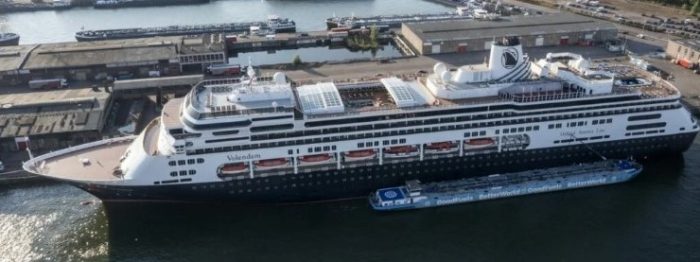Holland America Line completed the cruise industry’s first multiweek test of biofuels on board Volendam at Port of Rotterdam in the Netherlands.
The 20-day test was conducted in partnership with GoodFuels and Wärtsilä. The assessment was completed September 7, and in the first five days of the test the ship used a mix of 30% biofuel and 70% marine gas oil (MGO) in one of its main auxiliary engines.
For the final 15 days of testing, the ship used 100% biofuel. According to GoodFuels, there was a 78% decrease in lifecycle CO2 emissions during the final 15 days of trial compared to marine gas oil emissions.
We were excited to have this opportunity to test a next-generation fuel resource on a Holland America Line ship, and we are very encouraged by the results
said Gus Antorcha, president of Holland America Line
Dutch-flagged Volendam was selected for the test since it was located at the Port of Rotterdam, one of the global ports where GoodFuels operates the infrastructure necessary to provide biofuel waterside fueling services.
There is no significant difference for the ship’s team members in handling regular fuel oil versus biofuel. The use of a “drop-in” biofuel such as the one tested on Volendam requires no shipboard refitting or special equipment.
In July, Carnival Corporation’s German brand AIDA partnered with Goodfuels to run a blended biofuel test on board AIDAprima in Rotterdam. While biofuels have been tested on large diesel engines at shoreside research facilities and on a few cargo ships, these represented the first live tests on working cruise ships.
The two brands’ biofuel tests support the overall environmental mission, goals and aspirations of Carnival Corporation. Those include:
- Achieving a 40% reduction in carbon per available lower-berth-day by 2030;
- Expanding its alternative fuels strategy across its LNG program and battery, fuel cell and biofuel capabilities;
- Delivering a 50% reduction in absolute air emissions of particulate matter by 2030;
- The aspiration to achieve net carbon neutral operations by 2050.






























































